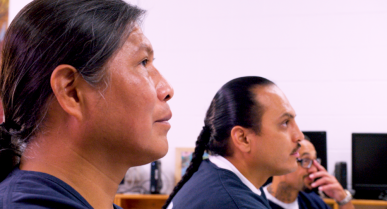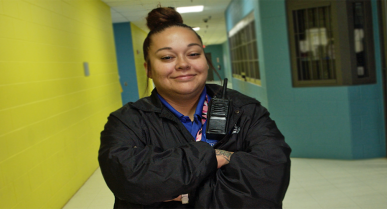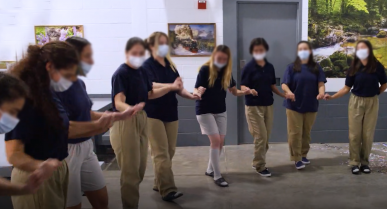NEWS: New program in Texas prison gives inmates tools to succeed in society

by: Wes Rapaport
Posted: Aug 23, 2019 / 07:03 PM CDT / Updated: Aug 25, 2019 / 06:32 PM CDT
LOCKHART, Texas (Nexstar) — Mary Henry wants to make “a lot of money” when she gets out of prison.
Henry, 45, is slated to be released from Lockhart Correctional Facility on Aug. 28, after a five-year incarceration for marijuana possession. She was arrested in Smith County in 2013.
“I made mistakes and I chose to do things that I shouldn’t have,” she acknowledges. “I’m not that same person anymore.”
Henry has spent the last 4 months in a new program in the prison which teaches inmates trade skills like manufacturing, to set them up for success when they get released.
After completing the courses through Austin Community College, the students take an exam. Those who pass become certified production technicians.
“They’re prepared for any sort of front-line operator or supervisory position in any sort of manufacturing environment,” said Don Tracy, Director of Corporate and Community Education for Continuing Education Division at Austin Community College.
This is the first time the college has partnered with the staff at the prison to offer a program like this. Fourteen students applied and were selected to participate.
Graduation day is Saturday. Family and other loved ones will attend.
“We are felons, so this is an opportunity that gives us a chance to be able to go out there and know that there is a job waiting for us and a job that is going to pay as well, no matter the stigma, no matter that record,” said Misty Campbell, 46, from Amarillo.
Not only do the offenders believe in second chances, but the prison staff do, too.
“We all make mistakes,” Senior Warden Jennifer Brown said. “It’s important that we provide the offender — someone’s loved one — a second chance to get it right.”
“You’re not just doing time here, we are providing them a service so they can be a better person when they go out,” Brown continued.
There was homework, and the student inmates said it kept them busy, especially without access to modern studying tools.
“We can’t get on the Internet, we don’t have the resources that they do out there,” Campbell explained. “You can’t just pick up a phone in here and phone a friend saying, ‘Hey, help me with this.’ A lot of us ladies don’t live in the same dorm, we live on two different sides of this unit. You can get in trouble for going on that other side. So it was not easy.”
Tracy explained bringing highlighters and file folders into the facility was a big deal.
“One of the things that we don’t think about — those of us who live our lives in the free world — is access to simple things like a pencil, like a pen, like a piece of paper, an index card, a highlighter,” he mentioned.
The students range from early 30s to early 50s. The longest-serving inmate in this group has spent 14 years locked up.
“When you have been gone as long as I have — I don’t even know how to work that phone in your hand, but I know how to do electrical circuits,” Amber McEntire, 36, told a reporter during a classroom visit this week. McEntire was convicted on charges of injury to a child, tampering with evidence, and possession of a controlled substance in the mid-2000s.
The students argue people should not write off their goals for re-entry into society.
“We are going to be somebody’s neighbor no matter what and so would you rather your neighbor try to be something successful?” said Lisa Harrell, 31, of Pensacola, Florida, who is serving nine years for manslaughter.
Despite the rap sheets of some of the students, Warden Brown said she believes programs like ACC’s workforce manufacturing training makes a difference in the lives of the inmates and the communities they return to.
“It’s important that we provide a great culture of caring, and that’s what we do on a daily basis— from our volunteers to our staff to the offenders, we have to build this person, this female, up to make sure that she is prepared for the world,” Brown said.
Tuition costs amount to $2,850 for the student inmates, which is what a typical course costs at ACC. Student inmates can apply for scholarships.
In a group interview, the offenders said they were glad to see this program launch for women first.
“That’s an amazing opportunity in itself and I’m thankful that the women are starting to get more things here because we are working mothers, we want to work, we need to work, and to have something to back us up with, a skill set, a life skill set is amazing,” Crystal Tijerina, 36, of San Antonio said.
“We have to be able to provide for a family financially and emotionally and I think it’s a great opportunity that we are able to have this and not just focus on the man — we need some care, too,” she added.
Between this weekend’s graduation and her release next week, Henry’s bubbly demeanor turned serious and emotional when she talked about the impact this program has had on her family, particularly her six-year-old grandson. He was almost two when she was imprisoned. The two talk on the phone regularly.
“For him to tell me that, ‘MoMo I am so proud of you for going to school.’ Because you were going to school and you’re graduating, I’m going to graduate, too.’”
When she told him she’s graduating from college, he said, “Well, OK, I’m going to graduate from college, too.”
“For him to say that that absolutely meant a lot to me and he’s really excited about it,” she said as her eyes welled up with tears.
The program is largely funded by the federal Workforce Innovation & Opportunity Act. ACC got the green light this week from the Texas Department of Criminal Justice to launch another round of the program. He said he aims to add classes, including welding, in future renditions of the program.
“Anything that we can put a certificate in that offender’s hand it would make a big difference for them getting a well-paid job when they leave the facility,” Warden Brown said.
About Gregory S. Coleman Unit
Gregory S. Coleman Unit is accredited by the American Correctional Association achieving over 99% compliance for both mandatory and non-mandatory standards in its most recent audit. Other accreditations and certifications include the Correctional Education Association and the Prison Rape Elimination Act (PREA).









